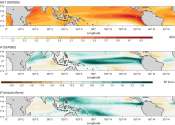Looking for life on Enceladus: What questions should we ask?
Does life exist beyond Earth? One of the most compelling places to consider this possibility is Enceladus, a moon of Saturn with a liquid water ocean encased in a frozen shell. There, plumes of water spray from ice fractures ...









